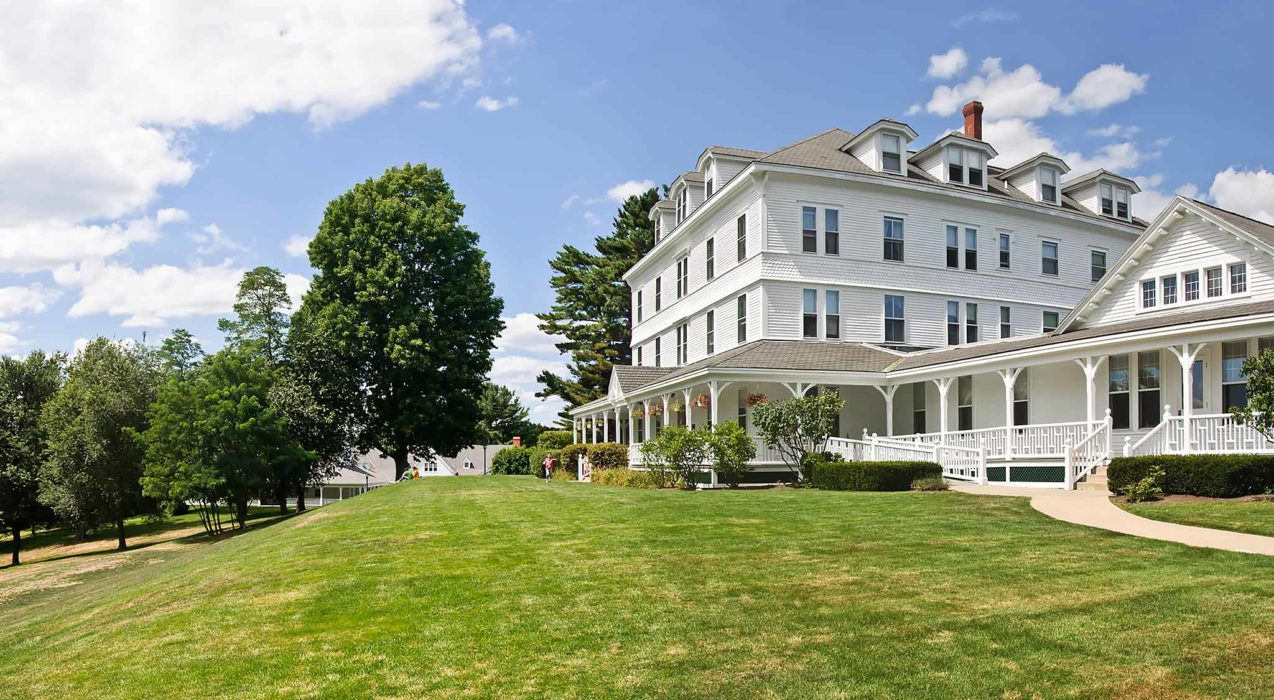TODAY, GREEN ACRE COMPRISES twenty-three acres of grassland and mixed pine and deciduous forest. But in 1912 the land west of the Inn was bare: a treeless view stretched as far as the curve of the river, affording the visitors a panoramic view of the reflecting sunset.
Half an hour after arriving at Green Acre yesterday afternoon, and checking into a corner room on the third floor of the Inn, ‘Abdu’l-Bahá delivered a short address to over eight hundred people. They overflowed the flower-laden “Eirenion,” a lecture hall that Sarah Farmer, Green Acre’s founder, had built and named with a Greek word meaning “The Hall of Peace.” Then ‘Abdu’l-Bahá set off for Portsmouth to visit Miss Farmer, who had been confined in a private sanatorium against her will for the past two years.
In the evening, as the sun settled over the wide western horizon, ‘Abdu’l-Bahá stood again in the Eirenion and gave one of the longest speeches he would deliver during his time in America. Its subject: the methods available to the human mind for investigating reality.

“There are four criteria or standards of judgment by which the human mind reaches its conclusions,” ‘Abdu’l-Bahá argued. “First, through sense perception; second, through the reasoning faculty; third, from traditional or scriptural authority; fourth, through the medium of inspiration.” His point was that each of these methods are unreliable.
The senses can’t be trusted, he said: “The eye sees the mirage as a body of water; it regards images in the mirror as realities when they are but reflections.” But if the senses are unreliable, ‘Abdu’l-Bahá noted, so is human reason. “The ancient philosophers in particular considered the intellect to be the most important agency of judgment,” ‘Abdu’l-Bahá related. “They held that every matter submitted to the reasoning faculty could be proved true or false and must be accepted or rejected accordingly.” “But, he pointed out, “this criterion is likewise defective and unreliable, for these same philosophers . . . have differed widely among themselves upon every subject of investigation.”
Then ‘Abdu’l-Bahá turned to scriptural authority. The problem here, he noted, is one of interpretation. “Who understands these books?” he asked. “By what authority of explanation may these Books be understood?” “It must be the authority of human reason,” he emphasized, “and if reason or intellect finds itself incapable of explaining certain questions, or if the possessors of intellect contradict each other in the interpretation of traditions, how can such a criterion be relied upon for accurate conclusions?”
Finally, ‘Abdu’l-Bahá rejected clairvoyance and inspiration as a reliable standard of truth. Such a statement played strongly at Green Acre, where a dozen different gurus from the East and specialists of esoteric Western thought spoke with presumed authority.

But then ‘Abdu’l-Bahá’s argument took a novel turn. While each of the standards of judgment he had examined proved “faulty and inaccurate,” they could, he concluded, be relied on when combined:
“A statement presented to the mind accompanied by proofs which the senses can perceive to be correct, which the faculty of reason can accept, which is in accord with traditional authority and sanctioned by the promptings of the heart, can be adjudged and relied upon as perfectly correct, for it has been proved and tested by all the standards of judgment and found to be complete.”
It was not an obvious conclusion, but it aligned with many of ‘Abdu’l-Bahá’s earlier conversations in America. Investigating truth, he seemed to be saying, is a multifaceted human endeavor, not one that can be confined to certain kinds of rationality but not others; certain kinds of inspiration but not others; or certain kinds of religion but not others.
When he was finished, ‘Abdu’l-Bahá spoke a prayer for Miss Farmer, whom he called “the source of this loving fellowship and assemblage.”






